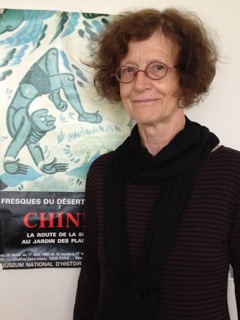Dr. Barbara Hendrischke

Internationales Kolleg für Geisteswissenschaftliche Forschung "Schicksal, Freiheit und Prognose. Bewältigungsstrategien in Ostasien und Europa"
Hartmannstr. 14
91052 Erlangen
- E-Mail: barbara.hendrischke@ikgf.uni-erlangen.de
- Telefon: +49 9131 85 64326
Home Institution: University of New South Wales (Australia)
IKGF Visiting Fellow October 2012 - May 2013
IKGF Research Project
Curriculum vitae
Dr. Barbara Hendrischke acquired a grounding in philology and classical philosophy during her initial academic training in Classical Studies at Tübingen University. Her on-going awareness of philological methodology motivated her to move to Sinology with an interest in the textual traditions of Chinas early and early medieval intellectual history. For her doctoral dissertation on the text of the Wenzi, she benefitted from the resources and academic advice during her stay at the Jimbun kagaku kenkyusho in Kyoto and completed her PhD at Würzburg University, Germany, in 1971. Her following early studies on the Taiping jing corpus were summarised in a monograph on its textual history, published in 1979. Bringing up children in Beijing and later in Sydney, she moved to work on aspects of contemporary China, as documented by her list of publications. She returned to undertake detailed research on the social philosophy of the Taiping jing in the 1990s. This research resulted in individual papers and finally a comprehensive monograph that forms part of the corpus for the first time available in a Western language. The monograph includes detailed annotations on terminology and argumentative techniques. Her research activities have been accompanied by on-going undergraduate teaching in the fields of Chinese and East Asian history and culture. She is an Honorary Member of the China Studies Centre of the University of Sydney.
Selected Publications
Books
- The Scripture on Great Peace. The Taiping jing and the Beginnings of Daoism. Berkeley: University of California Press 2006.
- Taiping jing. The Origin and Transmission of the 'Scripture on General Welfare'. The History of an Unofficial Text Hamburg: Mitteilungen der Gesellschaft für Natur- und Völkerkunde Ostasiens 75, 1979.
- Wen-tzu. Ein Beitrag zur Problematik und zum Verständnis eines taoistischen Textes, Würzburger Sino-Japonica 1Bern: Lang 1974.
Under the name of Barbara Kandel:
Articles
- "Early Daoist Ideas on Political Practice: How to Select and Control Government Officials" in Daoism: Religion, History and Society 2, 2010: 1-36.
- "Divination in the Taiping jing" in Monumenta Serica 57 , 2009: 1-70.
- "Han feis reading of Lao zi 38" M.Hermann and C. Schwermann (eds.), Zurück zur Freude. Studien zur chinesischen Literatur und Lebenswelt und ihrer Rezeption in Ost und West. Festschrift für Wolfgang Kubin, Sankt Augustin:Institut Monumenta Serica 2007: 127-154.
- "New Dimensions of Ancient and Medieval Chinese Thought", Review Essay, Asian Studies Review30 (2006):77-87. "
- "The Place of the Scripture on Great Peace in the formation of Daoism" in J. Lagerwey (ed.), Religion in Chinese Society, Hong Kong: Chinese University Press and École Française dExtrême-Orient 2004: 249-278.
- "Dialogues between Master and Disciples in the Taiping jing" in Lee Cheuk Yin and Chan Man Sing (eds.), A Daoist Florilegium. A Festschrift dedicated to Professor Liu Tsun-yan at his 85th Birthday,Hong Kong: Commercial Press 2002: 185-234.
- "The Virtue of Conformity. The Daoist re-writing of political biography" in B. Penny (ed.), Religion and Biography in China and Tibet, Richmond: Curzon 2002: 30-48.
- "Joy and Sadness in Daoism", Wolfgang Kubin (ed.), Symbols of Anguish: In Search of Melancholy in China Bern: Lang 2001: 105-141.
- "Early Daoist Movements" in L.Kohn (ed.) Daoism Handbook, Leiden: E.J. Brill 2000: 134-164.
- "The Taoist Utopia of Great Peace", Oriens Extremus 35 (1992): 61-91.
- "The Concept of Inherited Evil in the Taiping jing", East Asian History 2 (1991): 1-30.
- "Deng Xiaoping: Einer, der auszog, Ordnung zu schaffen", in K. Grobe, F.J. Krücker (eds.),Der kurze Frühling von Peking, Frankfurt 1990: 131-143.
- "Existenzielle Fragen - nicht nur aus dogmatischer Sicht. Ru Zhijuan's neuere Texte", die horen 156 (1989): 29-40.
- "Die Diskussion der Entfremdung in China", Asiatische Studien 43.1 (1989): 34-81.
- "Provokation oder Propaganda? Literatur im Reformchina", in K. Grobe-Hagel (ed.), China, Ein politisches Reisebuch, Hamburg 1987: 87-102.
- "Alles Schiebung - Chinas Geschäftsleben als literarisches Thema", in H. Martin (ed.), Cologne-Workshop 1984 on Contemporary Chinese Literature, Koeln 1986: 391-406.
- "Ru Zhijuan: Chinas sozialistische Revolution aus weiblicher Sicht", W.Kubin (ed.), Moderne chinesische Literatu, Frankfurt 1985: 394-411.
- "Rückwärts auf dem Weg nach vorn - Chinas neue Frauenliteratur", die horen 138 (1985): 214-220
- "Feminism in Contemporary Chinese Women's Literature", in A. Gerstlacher e.a. (ed.), Woman and Literature in China Bochum 1985: 379-428
- "How the Celestial Master Proves Heaven Reliable", in G. Naundorf e.a.(eds.) Religion und Philosophie in Ostasien, Festschrift für H. Steininger, Würzburg 1985:77-86.
- cChinese Research into Daoism after the Cultural Revolution", Asiatische Studien 38 (1984): 25-42.
- "New Interpretations of the Han Dynasty published during the Pi-Lin Pi-Kong Campaign", Modern China 4 (1978): 91-120.
- "Der Versuch einer politischen Restauration - Liu An, der König von Huai-nan", Nachrichten der Gesellschaft für Natur und Völkerkunde Ostasiens 113 (1973): 33-96.
Under the name of Barbara Kandel:


